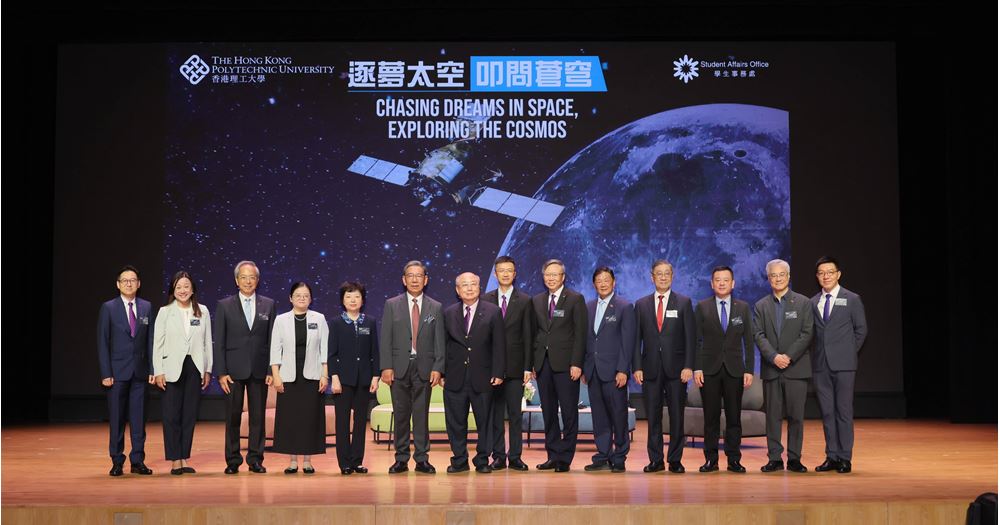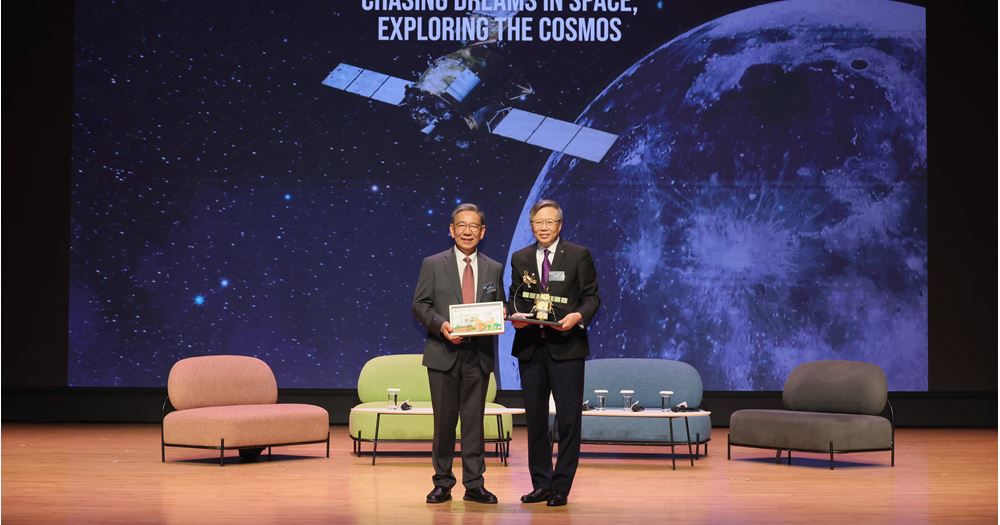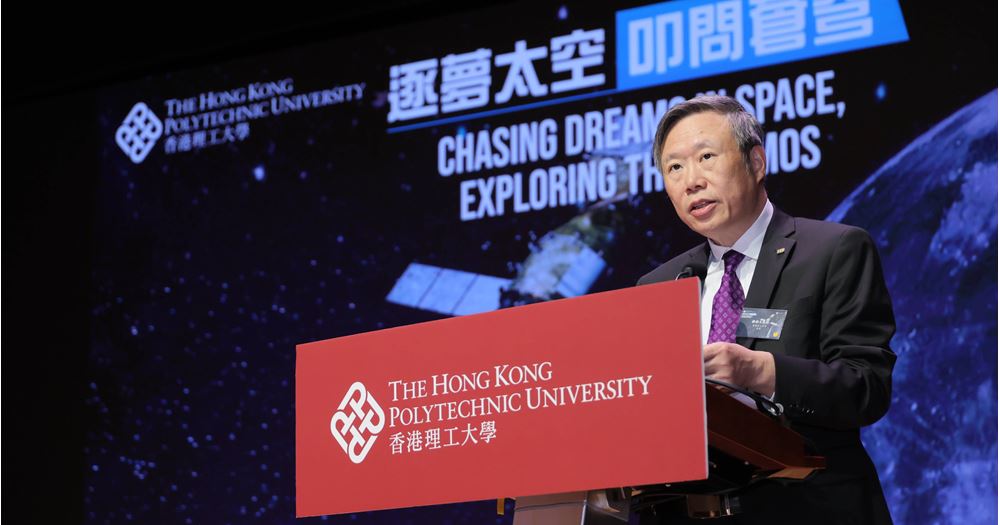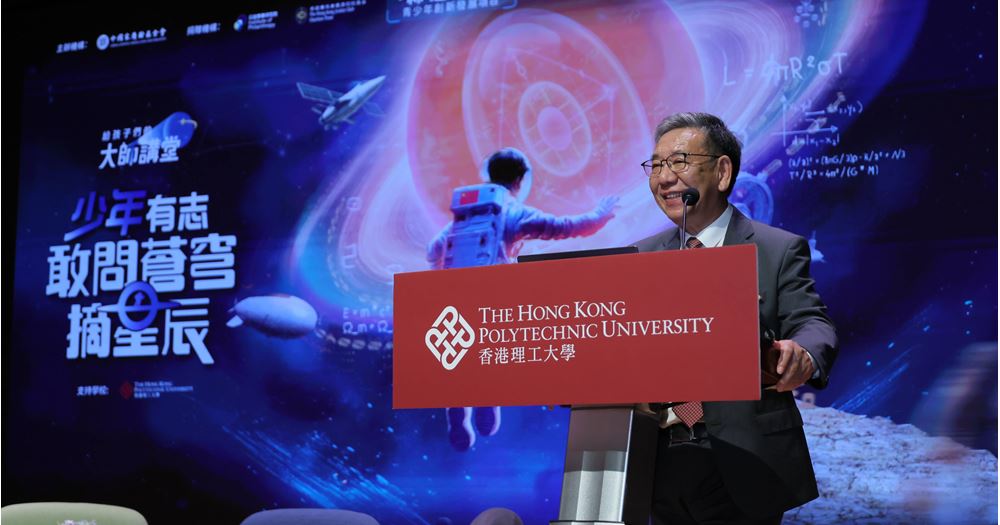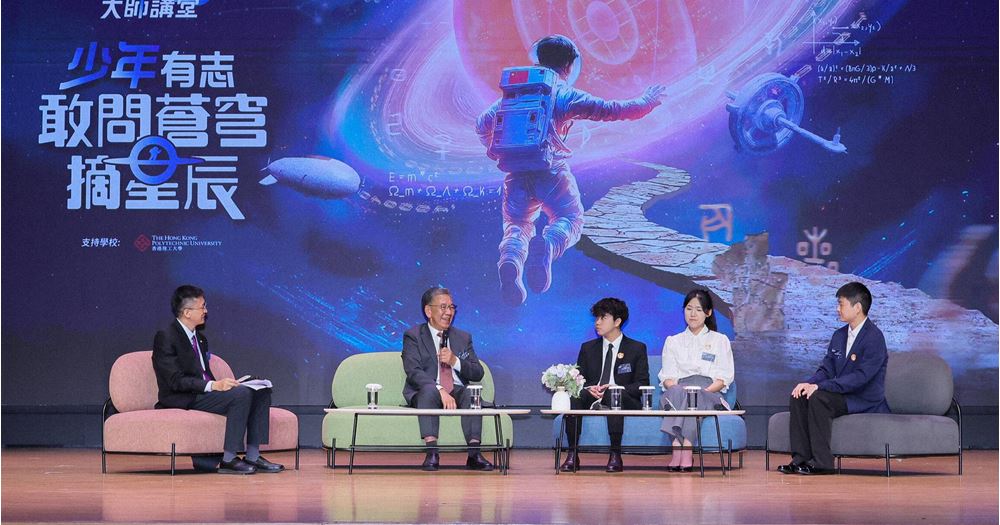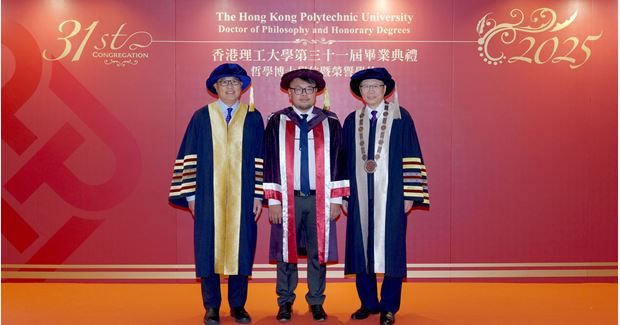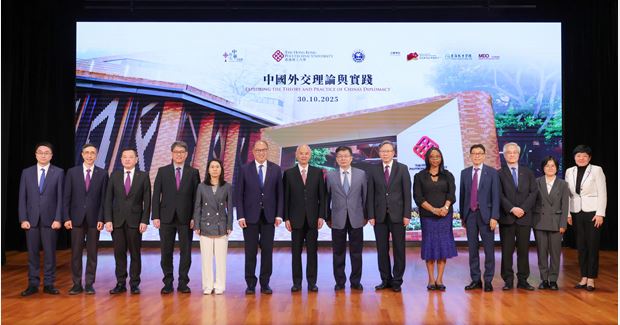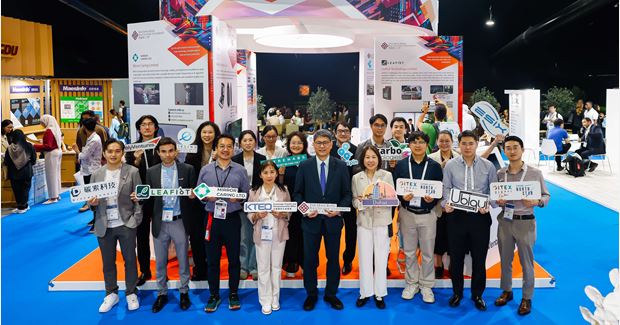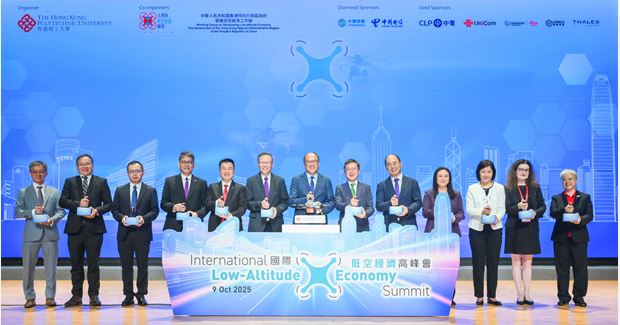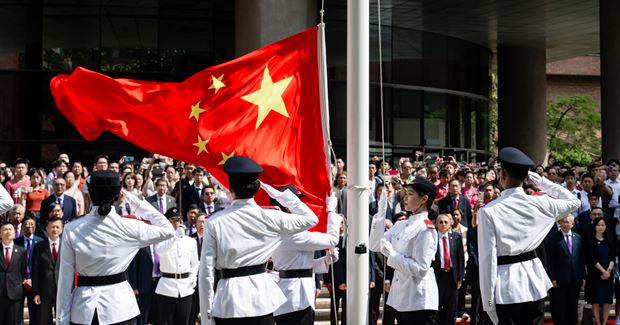Chief Designer of Chinese Lunar Exploration Programme delivers talk on development of national aerospace technology, encouraging students to chase dreams in space
17 Sep 2025
The Hong Kong Polytechnic University (PolyU) warmly welcomed Academician WU Weiren—Chief Designer of the Chinese Lunar Exploration Programme, Academician of the Chinese Academy of Engineering, Director and Chief Scientist of the Deep Space Exploration Laboratory, and Chairman of the International Deep Space Exploration Association—who delivered a talk titled “Chasing Dreams in Space, Exploring the Cosmos” at the Jockey Club Auditorium on campus yesterday. Academician Wu visited Hong Kong at the invitation of the China Soong Ching Ling Foundation to participate in “A Master Lecture For Children”, an event co-funded by the Institute of Philanthropy and The Hong Kong Jockey Club Charities Trust, with The Hong Kong Federation of Youth Groups as a strategic partner and supported by the Hong Kong Rosamond Foundation Company Limited. During his visit, Academician Wu graciously made time to visit PolyU. During the talk, he shared insights with more than 600 students, faculty, alumni and guests on the Nation’s latest developments and strategic plans for its aerospace missions.
Academician Wu Weiren is a leading expert long engaged in research and engineering practice in aerospace telemetry, tracking and communications and in systems engineering for deep space exploration. Academician Wu and his team have led various historic missions in the Chang’e Programme, making significant contributions to the Nation’s lunar and deep space exploration. He and his team are currently advancing the construction of the International Lunar Research Station (ILRS), a China‑initiated, multinational project.
Prof. Jin-Guang TENG, PolyU President, said, “Every step taken by the Nation’s aerospace researchers advances humanity’s quest to explore the unknown. As one of the most distinguished leaders in China’s aerospace field, Academician Wu has elevated the Nation’s deep space exploration technologies to a world-leading level. His invaluable experience and visionary insights inspire young students to explore the cosmos and ignite their passion for chasing their dreams in space.
Deep space exploration is one of PolyU’s strategic research domains, and the University has been engaged in aerospace innovation for more than 30 years. As our country continues to make breakthroughs in aerospace technology and deep space exploration, PolyU is honoured to be part of this journey—standing as the only university in Hong Kong to have participated in multiple national space missions.
Looking ahead, PolyU remains committed to cultivating outstanding research talent and driving innovation in related fields, helping to build the Nation into a space power.”
In his talk, Academician Wu reviewed the history of global space exploration and introduced the Nation’s landmark achievements in various space projects, including the manned space programme, lunar exploration, BeiDou Navigation Satellite System, and high-resolution Earth imaging satellite system. In just two decades, China completed the three phases of “orbiting”, “landing” and “returning”, achieving several world firsts. The Chang’e-5 mission, carrying out China’s first extraterrestrial sample-return mission and analysis of the lunar soil samples revealed the sixth new mineral discovered on the Moon — Changesite-(Y), contributing to humanity’s expanded understanding. Academician Wu also highlighted that over 30 locations on the Moon have been named with elements of Chinese culture, including the landing site of Chang'e-4 — the first soft landing on the far side of the Moon — which has been named Statio Tianhe, breaking the long-standing dominance of Western countries in lunar naming rights. He also mentioned that many universities and research institutions in Hong Kong have been actively involved in the Nation’s deep space exploration missions, with research teams, including those from PolyU, helping to ensure the safe lunar landing and sample collection of the Chang’e series, as well as the safe landing of the Tianwen-1 mission on Mars.
Looking ahead, the development and utilisation of deep space resources are gradually becoming one of the popular fields within the international scientific community, with significant implications for developing material resources, harnessing the unique resources of the space environment, and securing advantageous positions in deep space. Academician Wu noted that near-Earth asteroids, the Moon and Mars contain abundant resources such as minerals, water ice, helium-3 and atmospheric substances, which hold immense economic value, and that the ultra-high vacuum, microgravity and intense radiation found in space provide natural platforms for major scientific breakthroughs which could spawn and empower new industries on Earth, such as space pharmaceuticals. He also pointed out that space is a key arena for fostering new quality productive forces, listing a range of sectors and projects that could stimulate economic growth and improve people’s livelihoods, including space-based solar power stations, space tourism, space agriculture and space elevators.
After the talk, Academician Wu engaged in a dialogue session with PolyU students, which was moderated by Prof. WU Bo, Fiona Cheung Professor in Spatial Science, Associate Head (Research) of the PolyU Department of Land Surveying and Geo-Informatics, and Associate Director of the Research Centre for Deep Space Explorations. He discussed various issues with a PhD student from the Department of Land Surveying and Geo-Informatics, a master student from the Department of Aeronautical and Aviation Engineering, and an undergraduate student representative of the University’s Astronomy Club. During the session, a student asked what role artificial intelligence (AI) will play in future deep space exploration projects amid its rapid development. Academician Wu believes that, in the AI era, large-scale deep space exploration projects often involve tens of thousands of personnel and cannot be carried out solely by traditional methods. The application of AI will facilitate intelligent astronautics, exploration, control, communication, navigation and more.
Since 2010, PolyU has been participating in the Nation’s space exploration programmes and collaborating with the China Academy of Space Technology to develop and manufacture sophisticated space instruments. PolyU researchers have also used advanced topographic mapping technologies to identify the optimal landing sites for spacecraft. These contributions contributed to the success of the Nation’s lunar exploration missions, including Chang’e-3, Chang’e-4 and Chang’e-5, as well as the Mars exploration project Tianwen-1. In recent years, PolyU has established the “Research Centre for Deep Space Explorations”, and the “Joint Research Centre of Advanced Aerospace Propulsion Technology” in collaboration with the Academy of Aerospace Propulsion Technology.
PolyU has obtained approval to borrow lunar soil samples collected by the Chang’e-6 and Chang’e-5 mission from the Lunar Sample Management Office under the China National Space Administration’s Lunar Exploration and Space Engineering Centre to support a range of research projects. At the same time, PolyU scholars are also actively engaged in national aerospace and deep space exploration initiatives, including research studies conducted on the Shijian‑19 satellite and projects to mitigate the risk of hypervelocity impacts from space debris on satellites and space stations.
***END***
Press Contacts
Ms Hannah Liu
Officer, Public Affairs
- 2766 6375
- hannah-kw.liu@polyu.edu.hk
Press Contacts
Mr Edmond Siu
Assistant Director, Public Affairs
- 2766 5096
- edmond.siu@polyu.edu.hk
You may also like


